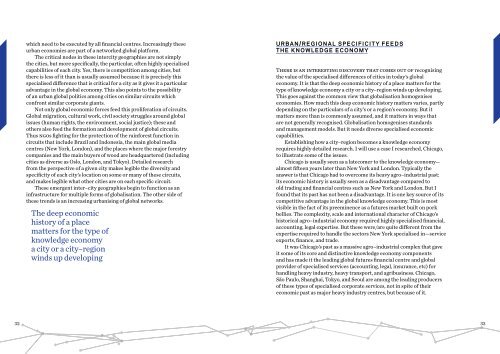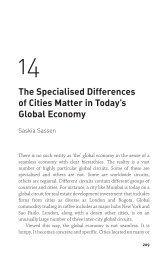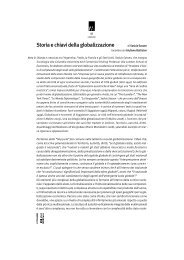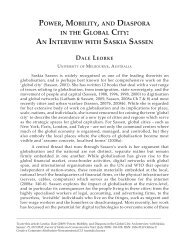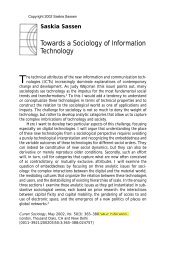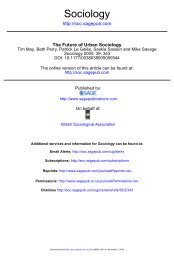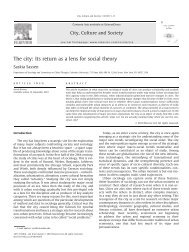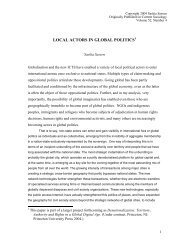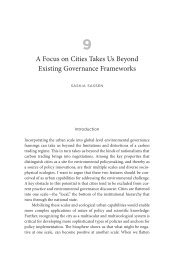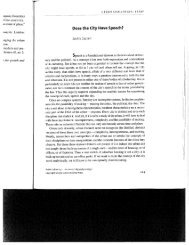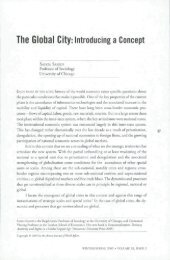Cities in Today's Global Age: An exploration of the ... - Saskia Sassen
Cities in Today's Global Age: An exploration of the ... - Saskia Sassen
Cities in Today's Global Age: An exploration of the ... - Saskia Sassen
Create successful ePaper yourself
Turn your PDF publications into a flip-book with our unique Google optimized e-Paper software.
which need to be executed by all f<strong>in</strong>ancial centres. Increas<strong>in</strong>gly <strong>the</strong>se<br />
urban economies are part <strong>of</strong> a networked global platform.<br />
The critical nodes <strong>in</strong> <strong>the</strong>se <strong>in</strong>tercity geographies are not simply<br />
<strong>the</strong> cities, but more specifically, <strong>the</strong> particular, <strong>of</strong>ten highly specialised<br />
capabilities <strong>of</strong> each city. Yes, <strong>the</strong>re is competition among cities, but<br />
<strong>the</strong>re is less <strong>of</strong> it than is usually assumed because it is precisely this<br />
specialised difference that is critical for a city as it gives it a particular<br />
advantage <strong>in</strong> <strong>the</strong> global economy. This also po<strong>in</strong>ts to <strong>the</strong> possibility<br />
<strong>of</strong> an urban global politics among cities on similar circuits which<br />
confront similar corporate giants.<br />
Not only global economic forces feed this proliferation <strong>of</strong> circuits.<br />
<strong>Global</strong> migration, cultural work, civil society struggles around global<br />
issues (human rights, <strong>the</strong> environment, social justice); <strong>the</strong>se and<br />
o<strong>the</strong>rs also feed <strong>the</strong> formation and development <strong>of</strong> global circuits.<br />
Thus ngos fight<strong>in</strong>g for <strong>the</strong> protection <strong>of</strong> <strong>the</strong> ra<strong>in</strong>forest function <strong>in</strong><br />
circuits that <strong>in</strong>clude Brazil and Indonesia, <strong>the</strong> ma<strong>in</strong> global media<br />
centres (New York, London), and <strong>the</strong> places where <strong>the</strong> major forestry<br />
companies and <strong>the</strong> ma<strong>in</strong> buyers <strong>of</strong> wood are headquartered (<strong>in</strong>clud<strong>in</strong>g<br />
cities as diverse as Oslo, London, and Tokyo). Detailed research<br />
from <strong>the</strong> perspective <strong>of</strong> a given city makes legible <strong>the</strong> diversity and<br />
specificity <strong>of</strong> each city’s location on some or many <strong>of</strong> <strong>the</strong>se circuits,<br />
and makes legible what o<strong>the</strong>r cities are on each specific circuit.<br />
These emergent <strong>in</strong>ter–city geographies beg<strong>in</strong> to function as an<br />
<strong>in</strong>frastructure for multiple forms <strong>of</strong> globalisation. The o<strong>the</strong>r side <strong>of</strong><br />
<strong>the</strong>se trends is an <strong>in</strong>creas<strong>in</strong>g urbanis<strong>in</strong>g <strong>of</strong> global networks.<br />
The deep economic<br />
history <strong>of</strong> a place<br />
matters for <strong>the</strong> type <strong>of</strong><br />
knowledge economy<br />
a city or a city–region<br />
w<strong>in</strong>ds up develop<strong>in</strong>g<br />
U R BAN/REGIONAL SPECIFICITY F E E D S<br />
T H E K N OW L E D G E E C O N O M Y<br />
There is an <strong>in</strong>terest<strong>in</strong>g discovery that comes out <strong>of</strong> recognis<strong>in</strong>g<br />
<strong>the</strong> value <strong>of</strong> <strong>the</strong> specialised differences <strong>of</strong> cities <strong>in</strong> today’s global<br />
economy. It is that <strong>the</strong> deep economic history <strong>of</strong> a place matters for <strong>the</strong><br />
type <strong>of</strong> knowledge economy a city or a city–region w<strong>in</strong>ds up develop<strong>in</strong>g.<br />
This goes aga<strong>in</strong>st <strong>the</strong> common view that globalisation homogenises<br />
economies. How much this deep economic history matters varies, partly<br />
depend<strong>in</strong>g on <strong>the</strong> particulars <strong>of</strong> a city’s or a region’s economy. But it<br />
matters more than is commonly assumed, and it matters <strong>in</strong> ways that<br />
are not generally recognised. <strong>Global</strong>isation homogenises standards<br />
and management models. But it needs diverse specialised economic<br />
capabilities.<br />
Establish<strong>in</strong>g how a city–region becomes a knowledge economy<br />
requires highly detailed research. I will use a case I researched, Chicago,<br />
to illustrate some <strong>of</strong> <strong>the</strong> issues.<br />
Chicago is usually seen as a latecomer to <strong>the</strong> knowledge economy—<br />
almost fifteen years later than New York and London. Typically <strong>the</strong><br />
answer is that Chicago had to overcome its heavy agro–<strong>in</strong>dustrial past:<br />
its economic history is usually seen as a disadvantage compared to<br />
old trad<strong>in</strong>g and f<strong>in</strong>ancial centres such as New York and London. But I<br />
found that its past has not been a disadvantage. It is one key source <strong>of</strong> its<br />
competitive advantage <strong>in</strong> <strong>the</strong> global knowledge economy. This is most<br />
visible <strong>in</strong> <strong>the</strong> fact <strong>of</strong> its preem<strong>in</strong>ence as a futures market built on pork<br />
bellies. The complexity, scale and <strong>in</strong>ternational character <strong>of</strong> Chicago’s<br />
historical agro–<strong>in</strong>dustrial economy required highly specialised f<strong>in</strong>ancial,<br />
account<strong>in</strong>g, legal expertise. But <strong>the</strong>se were/are quite different from <strong>the</strong><br />
expertise required to handle <strong>the</strong> sectors New York specialised <strong>in</strong>—service<br />
exports, f<strong>in</strong>ance, and trade.<br />
It was Chicago’s past as a massive agro–<strong>in</strong>dustrial complex that gave<br />
it some <strong>of</strong> its core and dist<strong>in</strong>ctive knowledge economy components<br />
and has made it <strong>the</strong> lead<strong>in</strong>g global futures f<strong>in</strong>ancial centre and global<br />
provider <strong>of</strong> specialised services (account<strong>in</strong>g, legal, <strong>in</strong>surance, etc) for<br />
handl<strong>in</strong>g heavy <strong>in</strong>dustry, heavy transport, and agribus<strong>in</strong>ess. Chicago,<br />
São Paulo, Shanghai, Tokyo, and Seoul are among <strong>the</strong> lead<strong>in</strong>g producers<br />
<strong>of</strong> <strong>the</strong>se types <strong>of</strong> specialised corporate services, not <strong>in</strong> spite <strong>of</strong> <strong>the</strong>ir<br />
economic past as major heavy <strong>in</strong>dustry centres, but because <strong>of</strong> it.<br />
32 33


